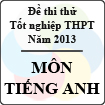Đề thi thử tốt nghiệp THPT năm 2013 - môn tiếng Anh - Đề thi thử tốt nghiệp THPT
Nội dung chi tiết:
Đề thi thử tốt nghiệp THPT năm 2013 - môn tiếng Anh - Đề thi thử tốt nghiệp THPT
ĐỀ THI THỬ TỐT NGHIỆP TRUNG HỌC PHỔ THÔNG
NĂM 2012 - 2013
MÔN THI: TIẾNG ANH
I - PHONETICS
Choose the word whose underlined part is pronounced differently from the others in each line .
1. A. laughed B. contained C. established D. talked
2. A. delights B. tasks C. feelings D. hopes
3. A. choice B. chemistry C. cheap D. chicken
Choose the word that has stress pattern different from that of the other words.
4. A. nation B. television C. interesting D. international
5. A. arrive B. apply C. university D. between
II - GRAMMAR AND STRUCTURE
Choose the best answer to complete each sentence.
6. John quit the job because he did not ______ his boss and workmates.
A. get on well with B. get acquainted with C. take over D. take note of
7. We find it ______ to do housework.
A. bore B. bored C. boring D. bores
8. He said that he ______ better after smoking a cigarette.
A. feels B. will feel C. would feel D. has felt
9. The teacher advised him ______ harder.
A. study B. to study C. studying D. studies
10. That's a very nice dress you're wearing. - ….. .
A. That's nice B. I'm glad you like it C. That's all right D. You're quite right
11. Lan: “Are you American?” – John: “__________”
A. Sorry! B. Yes? C. Excuse me? D. Pardon?
12. During the school year, my mother doesn't allow me ….. to bed late.
A. went B. going C. to go D. go
13. Not all teenagers are well ……………. for their future job when they are at high school.
A. interested B. satisfied C. concerned D. prepared
14. Ms Young, to ………….. many of her students are writing, is living happily and peacefully in Canada.
A who B. whom C. that D. whose
15. Finally, they succeeded …………..finding a cure for that strange disease.
A. with B. on C. to D. in
16. George took …….... of the fine weather to feed his baby tiger in the garden.
A. advantage B. interest C. profit D. charge
17. You will spend at least one year working abroad ….. you can find out how things operate overseas.
A. as long as B. because C. so as to D. so that
18. By far, the most important Vietnamese ………... is Tet ( The Lunar New Year ).
A. vacation B. holiday C. ceremony D. anniversary
19. At this moment, the team ………….. the game among themselves.
A. has been discussing B. have discussing C. are discussing D. is discussing
20. She has been very …….... during my illness.
A. supported B. supporting C. support D. supportive
21. We are going to …………... .
A. have our house to be decorated B. have our house be decorated
C. get our house being redecorated D. have our house redecorated
22. He finds it …….….. to read detective books.
A. fascinates B. fascinated C. fascinate D. fascinating
23. Do you think a close friend should share joy and sadness ……….….. you?
A. with B. on C. at D. between
24. The government ………. the earthquake victims with food, clothes and medicine.
A. gave B. provided C. offered D. carried
25. She is the first girl in my class ………….. part in the volleyball club.
A. to take B. takes C. taking D. take
26. We should ………….... every chance we have to speak English.
A. make use of B. make a use of C. make uses of D. make the use of
27. His bad exam results made his parents ………….. .
A. disappointed B. disappoint C. disappointing D. disappointment
28. Jack, ………….. I played tennis yesterday, was much fitter than me.
A. who B. whom C. with whom D. with who
29. The ……………... he was, the more cigarettes he smoked.
A. worried B. more worried C. less worried D. most worried
30. We visited the church …………... in the 18th century.
A. that was built B. which was built C. built D. All are correct
III - READING
Read the following passage. Choose the best answer (A, B, C or D) to complete the passage.
We can (31) __________other people in many different ways. We can talk and write, and we can send messages with our hands and faces. There is also the phone (including the mobile!), the fax, and e-mail. Television, film, painting, and photography can also communicate ideas.
Animals have ways of (32) __________ information, too. Bees dance and tell other bees where to find food. Elephants make sounds that humans can’t hear. Whales sing songs. Monkeys use their faces to show anger and love. But this is nothing (33) __________ to what people can do. We have language – about 6,000 languages, in fact. We can write poetry, tell jokes, make promises, explain, persuade, tell the truth, or tell lies. And we have a sense of past and future, not just present.
Radio, film, and television (34) __________ a huge influence on society in the last hundred years. And now we have the Internet, which is infinite. But what is this doing to this? We can give and get a lot of information very quickly. But there is (35) __________ information that it is difficult to know what is important and what isn’t. Modern media is changing our world every minute of every day.
31. A. talk to B. talk with C. communicate to D. communicate with
32. A. changing B. transferring C. exchanging D. giving
33. A. compare B. comparing C. is compared D. compared
34. A. have B. have had C. are having D. had
35. A. so much B. such much C. so many D. too much
Read the passage carefully and choose the correct answer.
Almost every language in the world has dialects and American English is no exception. At the present time there is an interesting study which is on American speech habits. This study has shown that different words are frequently used in different parts of the country to denote the same thing. For example, in the east, Americans use the word "soda" to denote a soft drink. In some parts of the west, a soft drink is "tonic". Such differences are usually a source of conversation and sometimes misunderstanding happens.
Speech and life all over the world have often changed. New words are being used when new discoveries are made and new concepts are formed. Usage determines what is correct and what is incorrect. Fifty years ago, it was incorrect to say "It's me." But today it is acceptable simply because most Americans say that instead of "It's I." People change, so language changes. What is wrong today may be right tomorrow.
36. Which sentence is true?
A. American English has no dialects. B. American English has dialects.
C. There is no study on American speech habits. D. American English- has no exception.
37. The study has shown that ______
A. different words are used in different parts to denote the same thing
B. different words are used in different parts to denote a different thing
C. there are no different words in different parts
D. dialects do not exist in American English
38. Differences in speech can lead to ______
A. dialects B. changes C. new concepts D. misunderstanding
39. What determines whether a word is correct or incorrect?
A. change B. usage C. dialect D. study
40. Language ______
A. frequently changes B. is the same in almost every part
C. makes misunderstanding happen D. makes people change
Download tài liệu để xem thêm chi tiết











